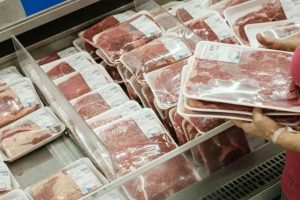By Kyle Aristophere T. Atienza, Reporter
MEAT IMPORTS rose 16.18% year on year in February, the Bureau of Animal Industry (BAI) said, with domestic supply remaining constrained by African Swine Fever (ASF).
Meat shipments hit 99.681 million kilograms (kg) during the month, slowing down from the 137.999 million kg in January.
Pork accounted for 53.598 million kg of the total volume for February, up from 38.994 million kg a year earlier. It was down from 70.449 kg in January.
Beef imports totaled 12.490 million kg, buffalo 1.876 million kg, turkey 21,588 kg, and lamb 15,825 kg.
Jesus C. Cham, president of the Meat Importers and Traders Association (MITA), said via Viber that ASF continues to “plague” pork production, while high input costs batter poultry production.
Agriculture Secretary Francisco Tiu Laurel, Jr. said in March that the hog population remains well below levels recorded before the ASF outbreak in 2019.
“Before ASF, we had nearly 14 million hogs, now, we have eight million. This creates a six-million head deficit,” he told the pork industry.
“With a growing population, demand is far higher than the previous 14 million,” he added.
The Department of Agriculture (DA) said in March that the BAI is working to ensure the commercial release by April of a Vietnamese vaccine against ASF.
Mr. Cham, meanwhile, said the release of the meat import allocation under the minimum access volume (MAV) remains delayed.
Pork imports falling within the MAV quota are subject to a tariff of 15%, against the regular rate of 25%.
The DA said in April it will overhaul the MAV rules, noting that the allocations have been “exploited by a small number of accredited importers.”
The MAV allocation for pork is 55,000 metric tons (MT), with 30,000 MT going to meat processors.
“At the same time Customs has been targeting higher revenue via high valuations. We will see the effects in the coming months,” Mr. Cham said.
“Meat imports are needed to fill the gap in supply, except for chicken which is sufficient in supply,” Philippine Chamber of Agriculture and Food, Inc. President Danilo V. Fausto said via Viber.
National Federation of Hog Farmers, Inc. Vice-President Alfred Ng, meanwhile, said concerns over higher tariffs imposed by the US will likely prompt the Philippines to maintain the low duties on meat and other agriculture products for longer “for fear of retaliation by the Trump administration.”
“This is not good for livestock raisers,” he said via Viber.
“We are seeing a chaotic economic new order shaping up and we are at its mercy since we are heavily dependent on food imports to feed our growing population,” he said.
“We must go back to basics — support our agriculture industry, support our farmers, and encourage more local production for ultimate food security and food sovereignty,” he added.
The US, which accounts for about 17% of total Philippine agriculture trade, on April 9 announced that it is pausing its plan to impose additional tariffs on most countries — except China — for 90 days.
The Philippines has been assigned a 17% tariff. In Southeast Asia, Cambodia faces the steepest tariff at 49%, followed by Laos (48%), Vietnam (46%), Myanmar (45%), Thailand (37%), Indonesia (32%), Malaysia (24%) and Brunei (24%). Singapore will be charged a baseline tariff of 10%.

